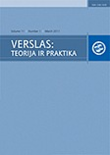Monetary Policy and the Causality Between Inflation and Money Supply in Indonesia
Monetary Policy and the Causality Between Inflation and Money Supply in Indonesia
Author(s): Gatot Sasongko, Andrian Dolfriandra HurutaSubject(s): National Economy, Governance, Economic policy, Economic development, Public Finances, Fiscal Politics / Budgeting, Corruption - Transparency - Anti-Corruption
Published by: Vilnius Gediminas Technical University
Keywords: inflation; macroeconomic policy; money supply; public policy;
Summary/Abstract: Conceptually and empirically, inflation volatility in Indonesia is a monetary and fiscal phenomenon. This study focuses on the macroeconomic policy and public policy especially causality between two variables namely inflation and money supply in Indonesia. This study uses Indonesian macroeconomic data of inflation and money supply from the Bank of Indonesia publication during 2007.1–2017.7. Inflation is measured by the consumer price index, reflects the annual percentage change in costs of acquiring a basket of goods and services to the average consumers that may change at specified intervals. Meanwhile, money supply is measured by the currency, demand deposits, time deposits, and saving deposits. Methodically, this study uses the Granger Causality model to determine the causality between inflation and money supply. The results show that there is a one-way causality between inflation and money supply in Indonesia. These findings imply that money supply causes inflation, but not vice versa. This condition implies that the role of Indonesian Government and Bank of Indonesia were very crucial in managing and controlling macroeconomic policy and public policy. Then, analysis of money supply and inflation also related to impacting factors such as money laundering, role of banks, taxation, tax evasion, and corruption.
Journal: Verslas: teorija ir praktika
- Issue Year: 19/2018
- Issue No: 1
- Page Range: 80-87
- Page Count: 8
- Language: English

